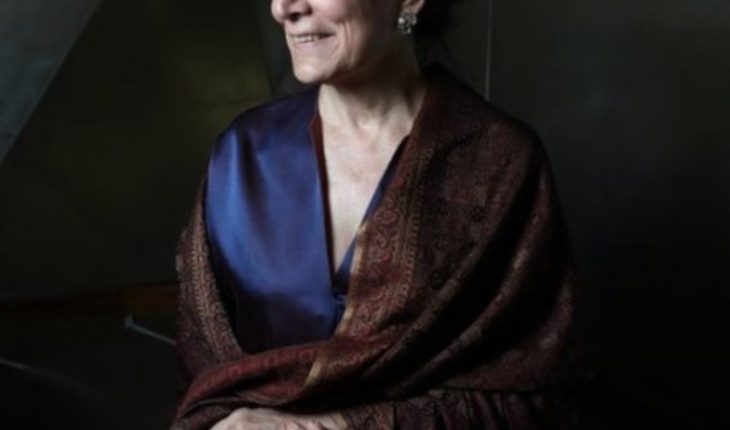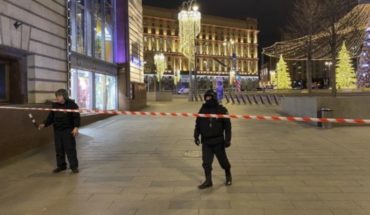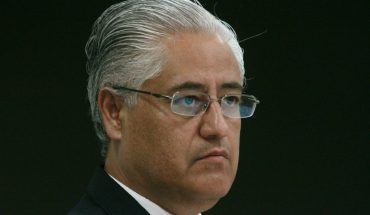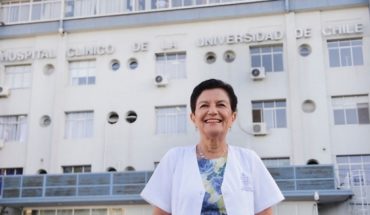Cartagena, Colombia, April 19 95. before a small group of expectant journalists, the writer Gabriel García Márquez defines the Mexican Alma Guillermo Prieto as “one of the ten best chroniclers of the world”.
So during the first workshop for a new Iberoamerican Journalism Foundation. Since then, thousands of journalists have passed through the Foundation and some of them have been able to learn carpentry of the craft from the hand of the same Alma Guillemoprieto.
Also since the presence in this 69-year Mexican-American journalism and culture has done nothing but grow: this year won the Princess of Asturias arts prize in Spain and probably already is among the 5 best chroniclers Latin American of all time, which should include the own Gabriel García Márquez.
With a particularity that makes it unique: all his Chronicles typed them in English – not in Spanish, their native language-, since he began writing for the English newspaper The Guardian.
Then it went through the offices of the Washington Post in the U.S. capital and Newsweek in Brazil. He finally decided that the offices were not theirs and began to write great stories for media such as The New Yorker and the New York Review of Books, which would give it to know.
And it all began exactly four decades ago, in 1978, when a young woman who dreamed of being a ballet dancer girl became curious how Nicaragua and came out, a couple of years later, as a reporter irreproachable.
With Alma Guillermoprieto, we speak as part of the there are Festival of Queretaro, in which participates.
Read all the coverage of the Hay Festival here by which Nicaragua?
Because excited me a lot when I saw the news of the insurrection that was taking place. I think that certain ideological emotion and also one time Latin Americans for, Nicaragua was the vindication of the tragedy of Chile.
Chile was a very hard blow for all those who had concerns, say. And Nicaragua appeared as a wonderful thing, I had lot of naivety, of candor, of an impressive enthusiasm… And we were many, not just me, that we have just in Managua contributing in one way or another. And I wanted to go there, even to report, but to see what that was like.
There was also some disappointment with the Cuban revolution, isn’t it? That you knew about you because even you lived in Cuba.
Yes. As that Nicaragua had the possibility of being a revolution without rigidity and dogmatism and endless cruelties of the Cuban revolution. Also I think it was very important to many that, with regard to Cuba, we had an extremely troubled relationship: admiration for his stance against the United States and rejection against what it meant the life of Cubans on the island.
What you followed after Nicaragua?
I I spent four years in a row in Central America. I came a year before the Sandinista triumph, at the beginning of the insurrection, and stayed until a year later, working as a reporter.
Then I went to El Salvador, darting in and out of there because it was very difficult. Then the Washington Post hired me and I spent two years in Washington. Then I was the correspondent for Newsweek for South America in Rio de Janeiro.
Copyright of the imagenTONY COMITI/GETTY IMAGESImage Sandinista captionGuerrilleros arrive in Managua after overthrowing and exile to Anastasio Somoza.Luego you went to Colombia. Why?
He had just resigned to Newsweek. My first book, “Samba”, on one of the Samba schools had been reporteado more dear, Estação Primeira de Mangueira, I knew that couldn’t write in Rio because it did not feel like a home. I liked a lot of Bogotá and it seemed to me that it was a great place to write.
Had already been several times, had become good friends, he was fascinated by the weather. At that time Bogota was a… well not provincial town exactly, but very isolated from the world. Drug trafficking had tremendously isolated Colombian society. Also the best stories are always counted in Colombia. I listened fascinated by all this collective delusion which is the Colombian history.
There were many factors. There were many rumbiaderos, bookstores. It was nice.
And you played terrible years, isn’t it? When they killed several presidential candidates and Pablo Escobar did everything from narco-terrorism…
I had a terrible time. Of the 88 92 was a very hard time in the life of Colombia. And share that I think that also made me part of that country. When hard things are shared because solidarity is forged.
Is there any country in Latin America that would like to learn more?
EM… for all! (Laughs).
Good, but you know them all…
I need the Caribbean: Dominican Republic, Puerto Rico and throughout the Caribbean. And I am missing the Guyanas, which are like a black hole in the conscience of Latin America…
Exactly, as if they lived on backs of… or better: we live with their backs to them.
Rather. It is extraordinary that, because they are huge, delicious potential and ignored completely.
But would say that (I would like to know more) all. The time that passes in the Peru seems to me to be very little, Chile I know very little. I live in Argentina happy… In Brazil I know River only. No, there is only one country in Latin America that not I would have liked at this time learn more.
Image captionAlma Guillermo Prieto together with Gabriel García Márquez employees of the Foundation for a new journalism and ten Colombian journalists who participated in the first workshop. Returning to Colombia, how you see the peace process?
Because I saw it with a huge thrill. It was one of the reasons why I returned to live in Bogotá. I thought that Mexico was a country which every day caused me more grief. And it would be nice to relive an excited Latin America.
And it seemed to me that (the peace process) was the great Charter of hope and optimism that the country was played. Missing to see if that process is lost or not.
Surely not those who voted No (in the referendum on the peace agreements) will agree with me, but it seems to me that bet on the peace process was an act of optimism and good faith. Need you much to Colombia not the peace, but the peace and stability and the decline in the homicide rate provided by the peace process.
You’ve been a privileged witness of what has happened in Latin America in the last 40 years and you’ve translated it the continent to a United States that is full of stereotypes about Latin America…
And also Latin Americans, who have always lived with their backs to their own neighbors, say.
And our own countries even…
Yes, as that looks toward Europe or the United States, but to gain very little inspiration are regarded each other.
Some have said – I believe that Vargas Llosa among them – that the most important thing that has happened in the last 40 years in Latin America is that most of the countries made the transition from military Government of far-right democracy… What do you think?
One of my disagreements with this idea is that people thought that regular punctual elections were democracy. And always felt me that not: was the door opening that you would allow that democracy was developing. It is a very important ritual, but ritual finally and after.
I think that two strides have been taken in recent years: hand programs social of all Governments increased longevity of the population, the rate of survival of the creatures and women above all. And that the educational level rose a little bit.
In many countries there is more communication at all levels, everyone has cell, the roads have improved. That hand is undeniable and very important.
On the other hand, I think that in the land of women is much advanced. Part of the rise of femicides we are experiencing is just that: there is a whiplash effect.
Copyright of the Imagenfundacion for a new PERIODSMO IBEROAMERICANOImage captionLa Gabriel García Márquez and Alma Guillermoprieto admiration was mutual. But I think that progress is undeniable and that is also reflected in the men, the liberation of women leads to the release of the men and that is much forgotten.
I think that nowadays men I know at all social levels are freer to express affection to their children, show more vulnerable. That seems to me very nice.
And in general there is an awareness of human rights, which in Mexico is a consciousness that is violated on a daily basis in the most appalling way. In Nicaragua today also human rights were flouted, but the awareness is there.
Soul and the worst?
I believe that, precisely as it was thought that democracy were elections and proved that not so, the disappointment with the very idea of democracy – in the last 15 years, say–is leading us to very dangerous situations. Venezuela is the most notable example of that.
And on the other hand it seems to me that the technological revolution is advancing at an unimaginable speed in any country in the world. And the gap that is opening up between us and the countries that lead the vanguard of scientific and technological revolution is very dangerous. We are again going to be in a situation of backward countries, that are not going to be able to be actors in the world, but reactors. Once again.
And the violence that seems to be cyclical. What is seeing now in Nicaragua, do not you remember to the era in which you started as a reporter?
Just this week I’m serving 40 years of having started as a reporter in Nicaragua. And I feel terrible to be returning to the same thing, but in a way… surreal.
Copyright of the OCÓN/GETTY IMAGESImage imagenINTI captionEstudiantes participate in a demonstration to ask for the resignation of President Daniel Ortega.El problema of the killings in Colombia is not the problem of the killings. Nor is it in Mexico. The problem of violence is the reflection of the slowness with which societies organize themselves to fulfill their own dreams. I don’t mean not even Governments.
These societies so tremendously divided, classist, so arrogant ruling classes… Then this gap between rich and poor is violent and that violence generates physical violence we suffer in Brazil, in Colombia, in Mexico, in Central America.
Something else that seems cyclical is populism, isn’t it? Peron, Yes, but also Chavez and the same Uribe…
If, and is a reflection of the same. They are societies fragmented, at war with themselves, not reconciled, not fair, not equal. And that gap of the inability of the company to fulfill the dreams of its inhabitants always arrive the demagogue. Always.
Arrives to say: I’m going to make happy. And it traffic with the rage of the people ignored, marginalized people. So it is recurrent, because while our terrible inequality problem is not resolved, there will always be a populist who arrive and occupy that vast black space in which people do not see a better future.
You’ve mentioned several times to Mexico, your native country. I now notice much enthusiasm among young and intellectual sectors of left by the arrival of Lopez Obrador to power. Do you share that enthusiasm?
I’m looking at. I think that the intelligentsia is very divided between those who have always been big enthusiasts of Andrés López Manuel Obrador and those who see it with great skepticism, just by the problem of populism. Huge promises, we don’t see the path from here to there to meet them.
But if I feel that it is a huge country change insofar as the model of previous Government and the ruling party has defeated absolutely decades and so many tragic. Then there is optimism. I’m waiting to see how this works and suddenly goes us well. I wish.
Where to start in Mexico? The violence is so enormous, so deep corruption…
That is the problem of López Obrador: promises much and solutions are so far poorly structured, when corruption and violence are structural. PRI it bequeathed him to the country after 80 years was the idea that without corruption is not possible to participate in society.
In Mexico, one to access any minimum privilege had that be willing to become corrupt. And drug trafficking was mounted on that machine that gave the PRI. It will be very difficult.
The TISCHLER/GETTY IMAGESImage imagenCARLOS copyright captionEl Andrés Manuel López Obrador.Vos enigma you said now that he had returned to Colombia for the peace process and to live this moment of hope… would you cause now return to live in Mexico?
No, I am very much at home in Colombia, I don’t think I go.
Some history in Latin America, which would have left you without writing?
Uff… EMM… No, they are so many stories and as yet I hope to meet some of them… There best I don’t say nothing.
Or that you are not leaving journalism after 40 years.
Well, I do less, obviously, because after 40 years, one has the feeling that know the development and the end of many stories and that is very dangerous when it comes to reporting. Then I have to find the stories that inspire me just because don’t is how they will end.
Any especially you is inspiring now?
Well, I have very aware’s return to Nicaragua. Because it seems to me that we are talking about too little of what is happening in that country, which is a lesson for all.
this article is part of the digital version of the there are Festival Querétaro, a gathering of writers and thinkers that are Realior in that Mexican city from 6 to 9 September 2018.





